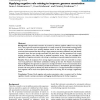Free Online Productivity Tools
i2Speak
i2Symbol
i2OCR
iTex2Img
iWeb2Print
iWeb2Shot
i2Type
iPdf2Split
iPdf2Merge
i2Bopomofo
i2Arabic
i2Style
i2Image
i2PDF
iLatex2Rtf
Sci2ools
128
click to vote
BMCBI
2007
2007
Applying negative rule mining to improve genome annotation
Background: Unsupervised annotation of proteins by software pipelines suffers from very high error rates. Spurious functional assignments are usually caused by unwarranted homology-based transfer of information from existing database entries to the new target sequences. We have previously demonstrated that data mining in large sequence annotation databanks can help identify annotation items that are strongly associated with each other, and that exceptions from strong positive association rules often point to potential annotation errors. Here we investigate the applicability of negative association rule mining to revealing erroneously assigned annotation items. Results: Almost all exceptions from strong negative association rules are connected to at least one wrong attribute in the feature combination making up the rule. The fraction of annotation features flagged by this approach as suspicious is strongly enriched in errors and constitutes about 0.6% of the whole body of the similarit...
Related Content
| Added | 08 Dec 2010 |
| Updated | 08 Dec 2010 |
| Type | Journal |
| Year | 2007 |
| Where | BMCBI |
| Authors | Irena I. Artamonova, Goar Frishman, Dmitrij Frishman |
Comments (0)

